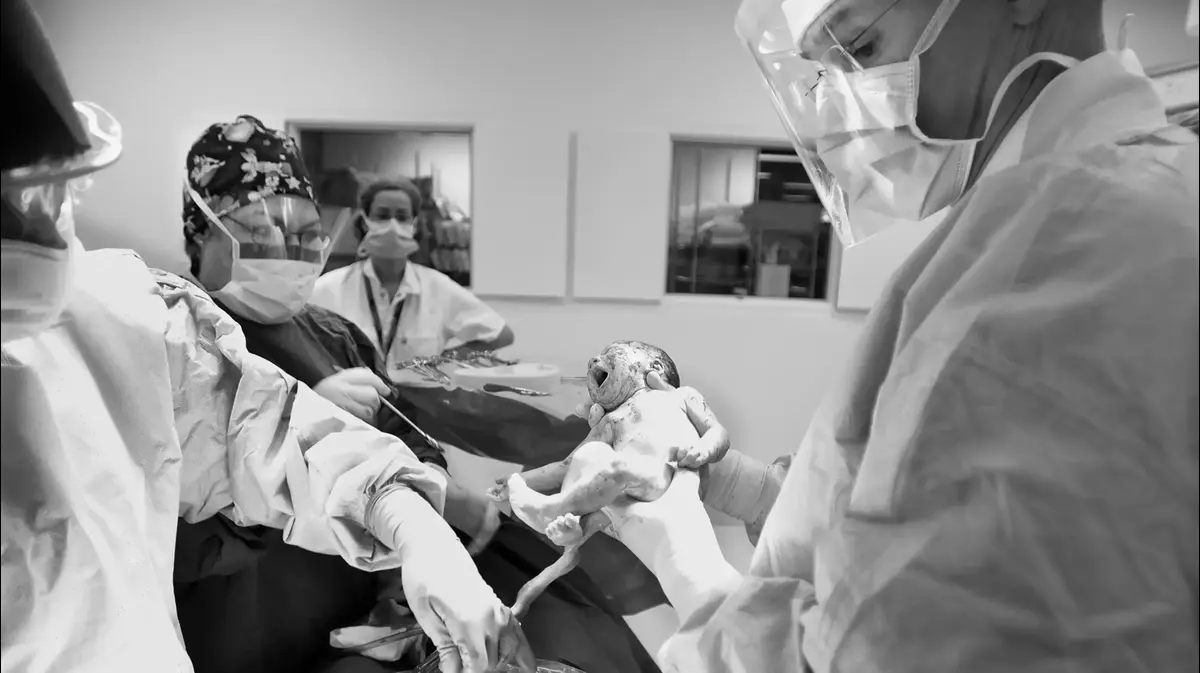Iris Cole interviews Dr. Oren Tana about depression and its treatment (Walla system)
"They put me in all kinds of positions to hear the baby's heartbeat. At least 20 students entered the room without asking permission or introducing themselves. When they put me on all fours I was completely exposed. I tried to cover myself from behind but the nurse threw my hand away. I felt like I was being stripped of my dignity Mine. Literally."
Every third woman in the western world describes her birth experience as a traumatic event, that is, an event in which the mother fears for her life or her physical well-being or the well-being of her fetus.
As a result of the trauma, one in ten women will suffer from post-traumatic symptoms after giving birth, and sometimes even from full-blown post-traumatic stress disorder (PTSD).
It is important to understand that post-traumatic stress disorder is costly and makes functioning very difficult.
These women will feel that they have a hard time "getting back to themselves" after giving birth.
They will feel alert, disturbed, scared and anxious.
They will often think about the difficult birth events, or even experience them as visions (flashbacks) during the day or as nightmares during the night.
They may be left with difficult thoughts about themselves and will often blame themselves for the events of the birth and experience great shame: "Why do they all have successful births and only I start parenting like this..?"
or "I should have done things differently...".
Postpartum depression
Since the thoughts about the birth cause great distress, the women will tend to avoid everything that might remind them of the birth, and therefore they will shrink socially (in order not to meet women who have given birth or talk to friends about the birth), they may not meet the doula who accompanied them and they will not work with her The birth experience, they will find it difficult to go to routine medical examinations and will not take care of themselves in terms of health (especially if the traumatic event resulted from the interaction with the medical staff) and will go and shut themselves up in their pavilion.
The avoidance and lack of support paves the way to postpartum depression which appears in very high rates in these women.
This depression often manifests itself in the difficulty of connecting with the infant and in feelings of numbness and "automatic" functioning, without joy or satisfaction around new parenthood.
In addition, this can be accompanied by difficulty sleeping, loss of appetite, tantrums, headaches, confusion, fatigue and more.
Only in recent years have the dimensions of the phenomenon become clear.
Lida (Photo: ShutterStock)
Only in recent years have the dimensions of the phenomenon become clear.
For many years, women survived difficult births, faced their mental consequences in silence, while bearing the burden of the growth of the newborn and without receiving social, research, or professional recognition for the suffering they experience.
If so, in the last twenty years, comprehensive research has developed in the field, and with it the understanding that this is a wide-ranging phenomenon is growing:
a meta-analysis conducted in 2014 found that about 3% of women develop post-traumatic stress disorder after childbirth, in 2017 research estimates already stood at 4 %.
A recently published study (2022) by Prof. Dani Horesh from Bar Ilan University and other researchers, examined data on 54,711 births from different countries, and found that 4.7% of women suffer from full-blown PTSD as a result of childbirth, and that 12.3% of women suffer from clear post-traumatic symptoms.
That is, 1 out of 20 women develops a psychiatric disorder that has significant mental effects as a result of a natural event that occurs within the walls of a hospital.
The phenomenal significance of these percentages can be grasped when placed in front of the development of PTSD as a result of participation in the war.
According to the American Veterans Association, 6% of soldiers who return from the battlefield are exposed to the development of post-traumatic stress disorder.
That is, birth and battlefield, lead to similar mental experiences both in terms of frequency and symptoms.
What makes birth traumatic?
There are clear factors that contribute to the formation of birth trauma.
The mental state of the mother before and during the pregnancy and the existence of traumatic experiences before the pregnancy - certainly place the mother at risk of a post-traumatic reaction following the birth.
Various factors related to the birth itself can also contribute: instrumental births or those accompanied by multiple medical interventions, the performance of an emergency caesarean section, births that lasted a long time, or those in which the subjective pain level of the mother was experienced as high - all of these can contribute to the development of a post-traumatic reaction for birth
However, studies show that the most influential factor in the formation of postpartum trauma is the treatment of the mother.
Women can withstand difficult and prolonged births, and make it through them with a sense of accomplishment and empowerment - if they feel safe, protected and heard during childbirth.
Qualitative studies scanning the descriptions of women who developed PTSD after childbirth show a uniform picture: the post-traumatic women described a difficult interpersonal experience during childbirth.
While they muster supreme efforts in order to give birth, they felt that the medical teams and sometimes also the birth attendants, treated them in an empathetic, mechanical and sometimes even dismissive way.
Women reported decisions that were made above their heads, medical procedures that were done on their bodies without them receiving sufficient information or consenting to it, harsh statements that were said about them and their bodies, and sometimes - actions that were experienced as violence.
The same statements were repeated: "I felt helpless and out of control", "invisible", "no one cared about me, or listened to me", "I felt unsafe".
"After an hour of the baby not moving in the birth canal, and trying to vacuum again and again, the doctor said it was too late for an emergency C-section. The baby was really stuck. And the staff started talking as if I wasn't there. The specialist doctor talked to the nurse about the likelihood that the baby would be harmed, and I'm right there, Right in front of her face."
To allow the mother to feel safe, taken care of, and that her well-being and that of her baby are the most important.
A woman after giving birth next to a nurse (Photo: ShutterStock)
What makes birth positive?
Contrary to the popular perception, a woman who leaves with "full hands", does not leave the birth experience behind her in the hospital and necessarily focuses on the healthy baby who returns home with her.
The birth experience can be a defining moment in the mother's birth if she comes out of the birth strengthened and confident, after being attentive to her body, feeling its strength and power, and doing the unbelievable - creating life.
Studies show that mothers who come accompanied by doulas, or birth attendants from security ministers and knowledgeable people - experience more positive births.
This is because a positive birth experience often meets a number of criteria:
the woman feels central to the birth, the one who causes the birth, and not the one to whom the birth is done.
This is also possible for women who choose to have an epidural or request a caesarean section - as long as the woman is the one who chooses the type of birth that is right for her.
The medical staff, despite the impossible load they were under, allowed the mother to feel safe, cared for, and that her and her baby's best interests were in front of their eyes.
Even in emergency situations, where there was little time to make decisions, the mother did not remain confused and uninformed about what was happening.
The understanding of the situation, even in complex situations, allowed mothers to feel in control and thus less overwhelmed and frightened.
The mothers felt that they and their opinion were respected.
Women, in general, tend to be attentive to medical teams and dismiss their opinion, because they often do not feel that they have sufficient authority and knowledge about their bodies.
Mothers who were allowed to express their opinions and desires, regarding themselves and their child, felt empowered and confident in their skills.
After the birth of the baby, we as a society tend to skip the maternal experience, and almost immediately turn our attention to the mesmerizing baby.
It is our responsibility as a second and third circle that surrounds and supports motherhood, to allow the new mother a supportive and nurturing environment no less than that which is possible for the baby.
After the entire birth, it is important to be interested in the authentic birth experience experienced by the woman and allow her to tell about it (as much as she is interested).
And in addition, to recognize the many efforts and considerable powers that maternity shows.
Positive, cherished and empowering statements allow the mother to feel her abilities.
And when the mother is established and strengthened, a more nourishing motherhood is also possible for the tender babies.
Inbar Farid Zaig is a clinical psychologist, the head of the female space - kashrut and integrative CBT treatment for women, she gave a lecture at the conference of the movement for freedom of choice in childbirth held last week.
health
Tags
birth
Post Trauma
Postpartum depression



/cloudfront-eu-central-1.images.arcpublishing.com/prisa/UGT3A2CDINB3LN3NMTZ4RJJOTU.jpg)




